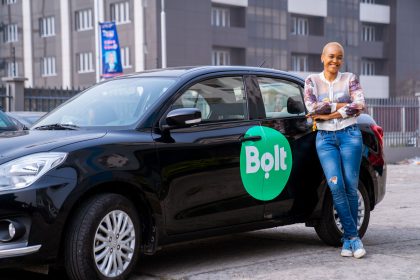In 2016, there weren’t many options for transportation in Accra. You were either stuck with local taxis or you had to use the cheaper and most popular option known as “trotro”.
In 2014, a company tried to use technology to make it easier to call a taxi to take a person from point A to point B. Easy Taxi was attempting to onboard taxi drivers for its platform where a user could book a ride, and choose a destination within the city for free between the hours of 9 am and 12 midnight.

Unfortunately, that did not take off and the company shut down its operations in Ghana a couple of years later.
Meanwhile, the popular app Uber was gearing up to test the waters in Ghana. In 2016, Uber officially entered the Ghanaian market and started its service in the capital Accra. The launch was largely successful with many users embracing the service for their day-to-day use.
After that, ride-sharing in Ghana grew tremendously over the years.
So in 2022, what is the current state of the ride-sharing space in Ghana? Let’s take a look:
The “Clone Wars”
After Uber had a successful launch in 2016, it showed that ride-sharing was capable of successfully running in Ghana despite the exit of Easy Taxi. This birthed a number of “copycat” apps emulating the Uber model.
A number of new startups emerged including Enshika, Dropyn, Driva, Uru, Yango, and many more.
The market, however, continued to be dominated by Uber mostly because of its user experience and brand recognition.
Taxify (now known as Bolt) entered the market briefly in 2016 and then exited. The ride-sharing company then re-entered with its new name “Bolt” and has become the strongest competitor to Uber to date.
Yango, a popular ride-sharing app based from Russia launched in Ghana in 2019 with very low fees to attract riders and promoted its 5% commission fee to attract drivers to their platform.
Fast forward to 2022 and many of the early “copycat” competitors have either died or exited the market.
The biggest names still in heavy play are Uber and Bolt. But other apps including Yango and BlackRide are becoming the alternative.
The “Other” Ride Sharing Apps
Although most of the ride apps are traditional car-sharing apps, there are other platforms offering ride-sharing for a larger number of passengers. Treepz is one of those companies. The startup offers buses and vans for a larger number of commuters and currently runs in the capital city Accra.
Other startups such as Rabarides and Vielly had attempted similar concepts. Unfortunately, those startups seem to have closed up shop or died off.
But Treepz is making steady traction. The company operates in Nigeria, Ghana, and Uganda. The company recently launched its business services for companies and corporations. They’re currently piloting an E-Bus service, where commuters can use an electric vehicle bus for commuting. But there is no timeline for the launch of that service at the moment.
Evolution Of The Ride Sharing Apps
The current crop of ride-sharing apps have started offering other services other than rides from one location to another.
Uber started offering package deliveries for users in 2020 during the pandemic and lockdown period with its “Uber Connect” feature. The company also launched its carpool feature called “UberX Share” where a rider can share a trip with another rider for a lower fare.
Bolt introduced “Bolt Foods” where users can request food deliveries via a separate app to their homes or offices.
Although Uber has its own “Uber Food” app, it currently only operates in Kenya and South Africa with no word on if and when the service will expand to West Africa.
Yango also provides delivery services for its users where they can request for a bike or car to deliver goods.

Unlike its counterpoints in the US which offer services like Freight, Bike, and Transit services, all the apps currently offer the basics like Ride, Delivery, and Food.
What The Ride-Sharing Ecosystem Looks Now in 2022
In Ghana, the market looks steady. Uber and Bolt continue to be the most dominant brands. Uber currently operates in 5 cities in Ghana including Accra, Kumasi, Cape Coast, Takoradi, and Sunyani.
When it comes to competing for drivers on their platforms, Uber and Bolt are offering the same commission rate of 20%.
Bolt also competes in the same cities Uber operates in but has its services in 3 extra cities with a total of 8. Bolt is in Accra, Cape Coast, Kumasi, Takoradi, Sunyani, Koforidua, Ho, and Tamale.
Yango currently operates in Accra and most recently launched in Kumasi. Most of the other smaller apps operate only in Accra.

When it comes to competing for drivers on their platforms, Uber and Bolt are offering the same commission rate of 20%.
On all the ride-sharing apps, cash appears to be the most popular form of payment although card payments are available. None of the apps offer mobile money payments which is the most popular form of payment in Ghana.
Yango offers the lowest commission fees at just 5%.
Competition is currently mainly between Uber and Bolt. Uber continues to tout its safety features as it prepares to rollout some new ones next year with Bolt being the only ride-sharing app offering food delivery services.
There are opportunities for other forms of rides like motorbikes in other African countries like Kenya where Uber offers “Safe Boda” where a rider can request a bike ride instead of a car. But in Ghana, there is a law against using bikes for passenger transportation, but “Okada”, (as it’s unofficially called), is used still some riders to get through traffic in the city.

There are other opportunities for companies like Uber and Bolt to use larger forms of transportation like buses or vans but at the moment, that space is dominated by platforms like Treepz.
Competition is currently mainly between Uber and Bolt. Uber continues to tout its safety features as it prepares to rollout some new ones next year with Bolt being the only ride-sharing app offering food delivery services.
But as the Ghanaian economy continues to go through a period of uncertainty with high inflation and a depreciating currency, these ride-sharing apps will have to think of ways to keep both drivers and riders happy, especially with costs.
Updated: We updated the original article to highlight that Yango operates in Accra and Kumasi and also has delivery services









